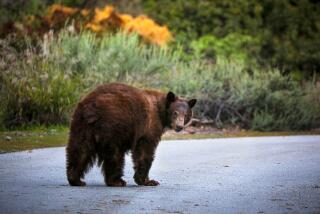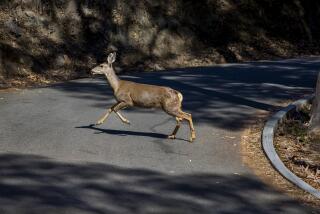Women Find They Enjoy the Hunt as Well as the Next Guy
- Share via
WASHINGTON — Snow fell in the winter afternoon, hushing the woods that surrounded Brandon Miner as she hid behind low brush in a clearing on a farm in Spotsylvania County, Va.
In her arms, the 33-year-old Annandale, Va., woman cradled a 12-gauge shotgun, and the misting whiteness rejuvenated her senses after a long, cold damp day.
Tripping from among the pine trees, driven by dogs whose barks could be heard in the distance, a young doe emerged. As the animal whipped across Miner’s sight lines, she snapped her shotgun up and fired twice. In an instant, the doe was dead, hit twice in her side.
“It’s very invigorating,” says Miner, who has been hunting deer for two years. “The quiet. Listening to the sounds in the woods. Watching the shadows change. I really have my senses stimulated.”
Once an almost exclusively male preserve--big-bellied lads with beer cans remain the stereotype--the world of hunting is changing with more women out in the field.
Of the estimated 14 million hunters in the United States, 7.5% are women, according to a 1995 survey by the U.S. Fish and Wildlife Service. The service has not tracked the increase in female hunters, but observers say it has been significant during the last several years.
“There has been an incredible explosion,” says Sue King, president of the Houston-based Women’s Shooting Sports Foundation. “My guess is that the numbers of women have multiplied 20 times in the last eight years. Women have more leisure time, and they are discovering all kinds of outdoor activities.”
“When I first went out, you’d hear, ‘Ah, a woman hunter,’ but now it’s getting ho-hum,” says Sharon Borg Wall, 45, a Washington resident who owns a farm on Maryland’s Eastern Shore, where the fourth annual Ladies Duck Hunt was held in December.
“The shooting sports are just as challenging for women as golf, for instance, and there is just as much opportunity for business networking,” she says.
The trend has been encouraged by state wildlife agencies, which have sponsored special hunts and training seminars for women in recent years. Maryland and Virginia wildlife officials say that promoting hunting among women is part of their agencies’ mission, just as they encourage bird-watching or hiking by as many residents as possible.
But anti-hunting groups say that state government should not be promoting an activity that part of the citizenry finds repugnant, even though the wildlife agencies depend on hunting-license fees for much of their funding.
Maryland officials offer hunting classes for women as part of a series of seminars called “Becoming an Outdoors Woman,” a program that began in Wisconsin five years ago and has spread to 37 states.
At the end of this month, the Virginia Department of Game and Inland Fisheries will be the host of a three-day, women-only spring turkey hunt. It will be the first such state-sponsored event in Virginia, and officials expect to hold regular women’s programs on hunting all kinds of game.
By creating programs for women, state officials say they are not recruiting women to hunt, but responding to a demand that already existed.
“We are charged with bringing recreational opportunities to as many people as possible, and that includes women,” says Rich Jefferson, a spokesman for the Virginia Department of Game and Inland Fisheries.
But the Fund for Animals, an anti-hunting group with offices in Silver Spring, Md., argues that the state officials’ interest in women emerged just as the traditional male hunting population declined in the 1980s.
“Although these programs are spin-doctored as an opportunity to ‘get acquainted with nature,’ the obvious intention is to recruit women hunters or, at the very least, to increase women’s acceptance of hunting,” wrote Heidi Prescott, national director of the Fund for Animals, in a letter she sent to wildlife agencies in 37 states last month, asking that the women’s programs be dropped.
“The American public is rapidly changing its view of killing animals for recreation, and that change is reflected nationwide in a dramatic, long-term decline in the number of hunters,” Prescott wrote. “It is entirely inappropriate for a public agency to play social engineer by attempting to reverse this deep societal trend.”
According to the fund, the number of male hunters older than 12 has declined from 11% of the American population in 1980 to 7.5% in 1991.
But several female hunters in the Washington area said they came to enjoy the sport with no prompting from the states.
Symone Grauer, who lives in the Lake Ridge section of Prince William County, Va., says her interest started when she married an avid hunter.
“He was gone all the time,” she says. “He encouraged me to go out, and I thought, ‘That’s one way to get to spend some time with him.’ So I went out, and I really enjoyed it. It’s not just about getting a deer. It’s very calming, very peaceful. And you have time to think when you spend all day on your own.”
More to Read
Sign up for The Wild
We’ll help you find the best places to hike, bike and run, as well as the perfect silent spots for meditation and yoga.
You may occasionally receive promotional content from the Los Angeles Times.






